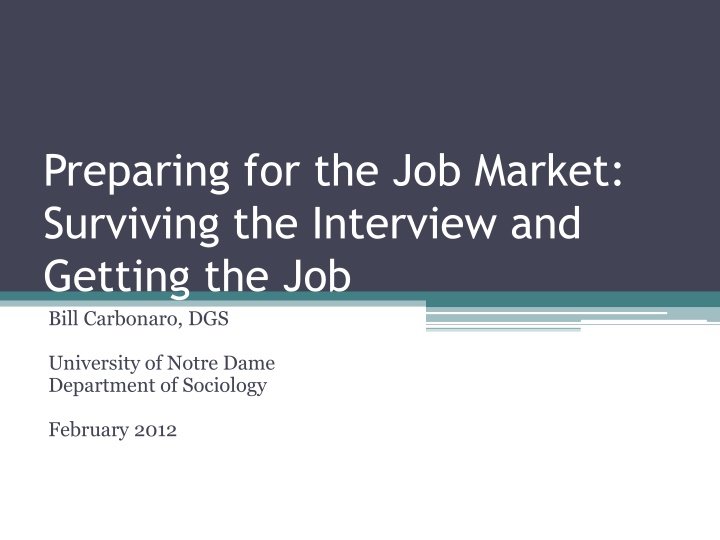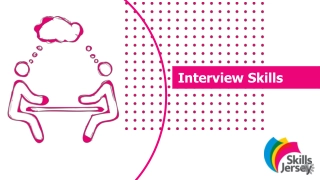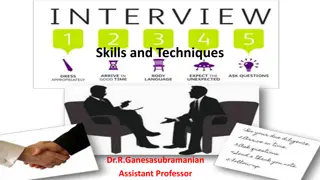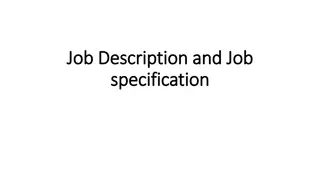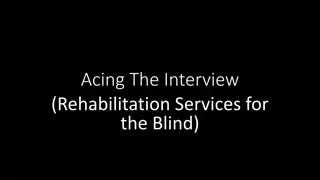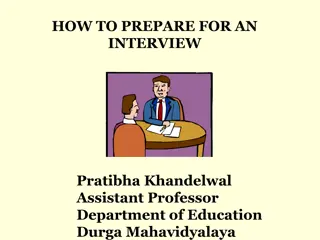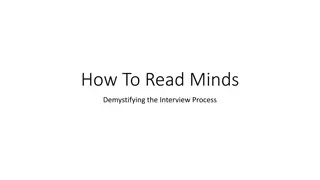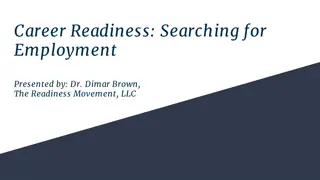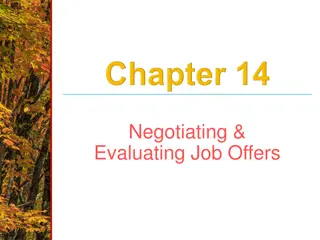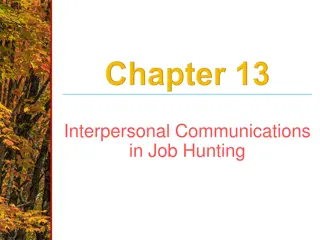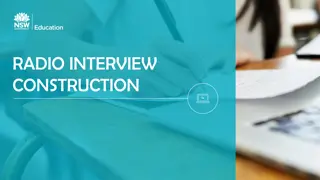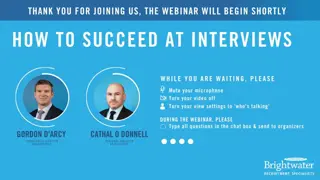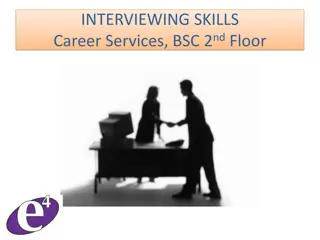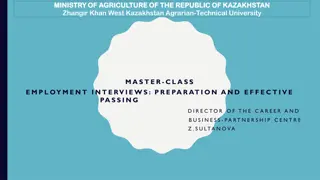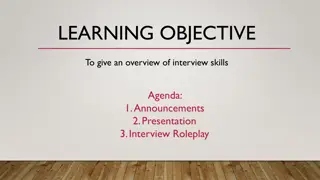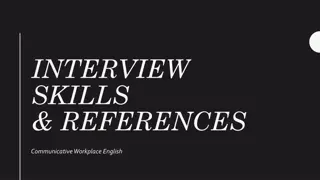Job Market Interview Strategies
Navigate the job market successfully with tips on surviving the interview and securing the job. Learn about the hiring process, interview stages, setting up interviews, pre-interview conversations, and making informed decisions. Ensure the job aligns with your expectations before proceeding. Gather essential information to determine if the position is the right fit for you. Make the most of pre-interview discussions with chairs to evaluate important job aspects such as teaching loads and research focus.
Download Presentation

Please find below an Image/Link to download the presentation.
The content on the website is provided AS IS for your information and personal use only. It may not be sold, licensed, or shared on other websites without obtaining consent from the author.If you encounter any issues during the download, it is possible that the publisher has removed the file from their server.
You are allowed to download the files provided on this website for personal or commercial use, subject to the condition that they are used lawfully. All files are the property of their respective owners.
The content on the website is provided AS IS for your information and personal use only. It may not be sold, licensed, or shared on other websites without obtaining consent from the author.
E N D
Presentation Transcript
Preparing for the Job Market: Surviving the Interview and Getting the Job Bill Carbonaro, DGS University of Notre Dame Department of Sociology February 2012
The Hiring Process (at most Schools) Apply Interview Offer Offered a Position Invited Applicants Applicant Pool
The Interview R-1, 2: The Interview The Job Talk (R-2 sometimes also a teaching tryout ) Informal Interactions: Breakfast, Lunch, Dinner, etc. One on One Meetings with Faculty, the Chair, Deans
The Interview Teaching 1, 2: The Interview Teaching a class (observed by the chair, other faculty) One on One Meetings with Faculty, the Chair, Deans Informal Interactions: Breakfast, Lunch, Dinner. (Sometimes - Research Talk)
The Interview You ve been invited for an interview. Hurray! Should you go? NOW is the time to get more information from the chair about the expectations regarding the position. CALL him/her and get more information.
Accepting the Invitation? PRE-INTERVIEW Conversation with the Chair Make sure that the position meets your expectations BEFORE you agree to go! If you learn that the job is a non-starter, don t go! Ex -- If the job has a 4-4 teaching load, and you don t want that, don t go!
Accepting the Invitation? PRE-INTERVIEW Conversation with the Chair Keep the conversation focused on broad parameters of the position (Teaching load, research focus, tenure line, joint appt.s, etc.) * Save more specific questions about the position and the department for the interview (e.g., criteria for promotion, hiring record, etc.) AGAIN the goal is to learn whether this position is worth pursuing.
Accepting the Invitation? PRE-INTERVIEW Conversation with the Chair Don t start talking about your needs and/or wants at this stage. ** Remember your goal is simply to gather information at this point. It s about the job, not you (that comes later).
Spousal Issues Appropriate to Raise with Chair My spouse needs an academic job. My spouse has a really unique job and will struggle to find a comparable one upon moving. ** Raise these issues with the chair before visiting.
Spousal Issues Not Appropriate to Raise with Chair My spouse will need A NEW JOB My spouse needs A JOB
Accepting the Invitation? PRE-INTERVIEW INTEL Gathering Ask your advisor and faculty your the department about the department that has invited you for a talk. Do your homework via the web CAVEAT don t just rely on the department s own web page for information about itself.
Scheduling the Interview 1. Be flexible competing obligations are truly secondary (E.g., cancel or get someone to teach your class) 2. Make sure that you have adequate time to prepare (especially if it is your first interview) 3. Be sure to arrive early! (A day ahead, if possible)
The Interview NEVER FORGET you are ALWAYS on during the interview. Be mindful of presentation of self issues. Be yourself but always be HIGHLY professional.
The Interview Dress Code Look professional Err on the side of too dressy rather than too casual. Be dressier than you would be when teaching a class. * Make sure that you are comfortable.
Mostly YES NO Slit is too high! Comfort? YES YES YES
Careful - not too hip! YES Just right A little too dressy? MEH too casual OK NO
Study your Schedule 1. If you don t knowing why you are meeting with someone, ASK! 2. Know the purpose of each meeting. Informational or evaluative? Or both? 3. Learn about whoever you will be meeting with. 4. Don t ask for changes, unless something really important is at issue. E.g., don t ask for the job talk to be moved to the PM because are a morning person
The Interview DO YOUR HOMEWORK BEFOREHAND! 1. Learn about the department (from both sources inside the institution and outside): Who are the faculty? What do they do? What are the substantive areas in the department? What do people in your department think about the department? Info from ASA, NRC, U.S. News?
The Interview DO YOUR HOMEWORK BEFOREHAND! 2. Learn about how the hiring process works (from the chair): Does the faculty as a whole vote to make an offer? A sub-committee? Who are the decision makers? What happens outside the department? What is the timeline?
One on One Meetings Faculty are trying to get a feel for: Your off-stage persona. 1. What you will be like as a colleague. 2. Whether you can think on your feet. 3. What does their gut tell them? Be relaxed, but always remain professional!
One on One Meetings Their chance to ask questions: Tell me about your research (or dissertation) . . . Prepare your elevator pitch before arriving! What are you looking for in a department . . . ? Know what you are about and what you are looking for ???? (The wild card!) Be prepared for anything.
One on One Meetings Your chance to ask questions: Ask about faculty s research (if appropriate) often people s favorite topic (themselves!). Ask people whether they like the job, institution, area, etc. Ask about the graduate students Ask about the undergraduate students
One on One Meetings Don t: . . . ask questions related to an offer before you have it! (Don t talk salary, benefits, research accounts, etc.) That s what negotiations are for. . . . ask people specific questions about their salary, teaching load, etc. . . . ask chair questions of the other faculty.
One on One Meetings Don t: . . . Ask about other candidates who are being interviewed for the position. . . . ask overly personal questions. . . . BE NEGATIVE! Don t talk about other people unless you are complimenting them!
One on One Meetings Don t: . . . Try to be overly funny, clever, sarcastic, etc. . . . LET YOUR GUARD DOWN!
One on One Meetings REMEMBER: These meetings are partly evaluative ( Should we hire this person? ) BUT also partly selling the department (recruiting you) Take what is said with a grain of salt
Meeting with the Chair 1. Save questions about the department for the chair. 2. Raise special issues or concerns ONLY with the chair. 3. Be completely honest. But, be guarded in what information you share. ** Don t weaken your bargaining position.
Meeting with the Chair Should always ask about: Tenure expectations what are the criteria, and what is the process? Recent Tenure cases confidential, but learn what you can. What distinguishes tough and easy cases in your department?
Meeting with Graduate Students Mostly informational, partly evaluative Learn a little about the graduate program beforehand Get a broad overview of the program Ignore minor details
Meeting with Graduate Students Mostly informational, partly evaluative During the meeting, learn about the students Are they likely to help you with your teaching and research? Are they serious and professionally oriented? What kind of work are they doing? What are their long term goals?
Dining Tips Don t eat messy foods (that could ruin your attire!). Generally, avoid eating food with your hands. Drinking alcohol is generally a bad idea.
The Job Talk The SINGLE most important thing (for research jobs)! For most people on the faculty, this is the ONLY time they will encounter your WORK as a scholar! Do not assume that anyone in the department will actually read your work!
The Job Talk IMPORTANT! Ask the chair what the expectations and norms are for his/her department! (Learn the local culture!) What s the format? (Length, Q&A, Soc or Econ rules of engagement?) What are the expectations? (Heavy on theory?, Methods?, Findings?, etc.) Who is typically in the audience?
The Job Talk Make sure that you present your VERY BEST WORK. Don t take chances with hot off the presses results/analyses Make sure that the material for the talk is vetted by your advisor
The Job Talk What to present? Option #1 published paper NORMATIVE Typically, the safest choice. Option #2 on-going dissertation work Option #3 a mix of option 1 and 2
The Job Talk KEEP IN MIND . . . Unlike ASA, there are many people in the audience who are NOT in your subfield. Don t assume that the audience is knowledgeable about the literature in your subfield.
The Job Talk KEEP IN MIND . . . ALSO -- Many people in the audience may have NO familiarity with your data (if secondary data sources) or even your methodology. You need to ensure that your talk is satisfying to both a general sociological audience, as well as the specialists.
The Job Talk YOUR TASK: TELL YOUR AUDIENCE A STORY Include as many elements of good storytelling as possible in your talk: Foreshadowing, character development, suspense, mystery, climax, resolution/ denouement.
The Job Talk YOUR TASK: HAVE A CLEAR TAKE AWAY Seek to strike a balance between the big picture and nuance SIMPLIFY, but don t OVER-SIMPLIFY
The Job Talk PowerPoint Tips Use visuals rather than just text to make your presentation more interesting Occupy Wall Street vs.
The Job Talk PowerPoint Tips LESS IS MORE: Use more slides with LESS INFORMATION on each one ** AVOID INFORMATION OVERLOAD!!
The Job Talk PowerPoint Tips Engage the audience . . . but make sure that they remain focused on YOU! ** Don t just read your slides verbatim! BORING!
The Job Talk PowerPoint Tips Don t present tables of results with hundreds of numbers that people can t read. Abridged tables are preferable. Try to use graphs and figures to present results rather than numbers (picture = 1,000 words).
The Job Talk PowerPoint Tips Don t present lengthy quotes with tiny words that people can t read. Read the quote aloud, and use the slide to emphasize its importance/significance.
The Job Talk PRACTICE, PRACTICE, PRACTICE! Memorize most of your talk. Practice your talk in an empty room (talking out loud) with your PowerPoints.
The Job Talk PRACTICE, PRACTICE, PRACTICE! Time your presentation when you practice. Do a practice job talk in front of a live audience of sociologists (faculty, fellow grad students). Get feedback and adjust accordingly.
The Job Talk Remember: Use a clicker. Don t be boring. Don t run long. Don t tell bad jokes (funny ones are OK!). Don t stare/talk to the ground and/or screen. Don t talk so softly that people in the back can t hear you.
